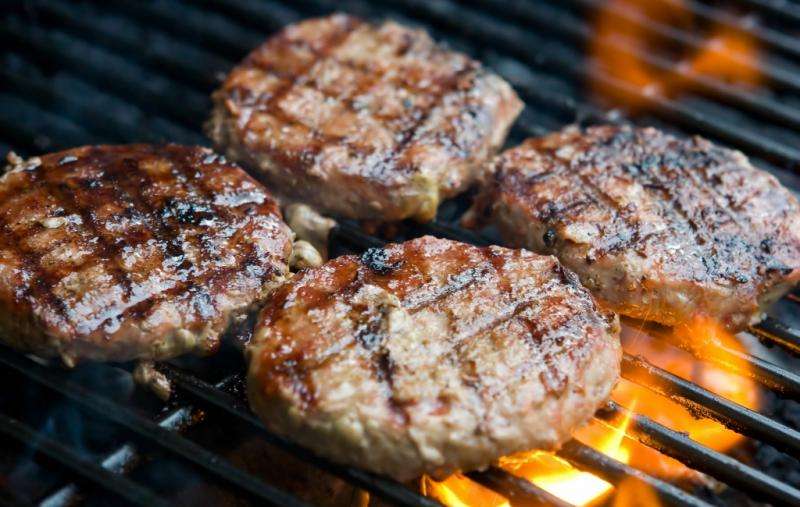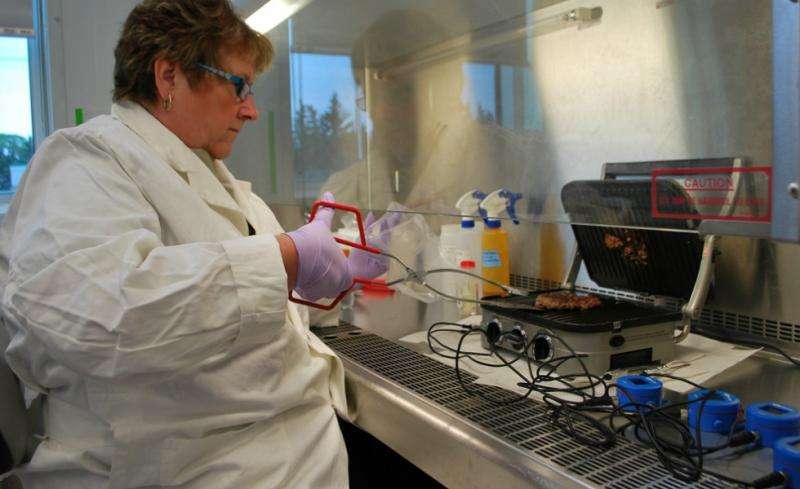Ground beef may need higher cooking temperature to be safe

That hamburger you dutifully grilled to the temperature recommended by government health agencies may not be as safe to eat as you think.
Food researchers at the University of Alberta have made the surprising discovery that cooking ground beef at 71 C—the level of heat long advised by Health Canada—does not always eliminate all the strains of Escherichia coli, a bacterium found in the gut of both humans and animals.
That's significant because although not all E. coli are harmful, nasty strains such as E. coli O157 can cause kidney failure or even death.
"We've been hammering consumers for years to cook chicken properly, to handle it properly, and to do the same with ground beef. But still we seem to have these outbreaks of E. coli [attributed to hamburgers]," said Lynn McMullen, a food microbiologist in the Department of Agricultural, Food and Nutritional Science.
"Does this explain why? It might."
McMullen, fellow microbiologist Michael Gänzle and several graduate students first became aware of the inconsistent behaviour of E. coli eight years ago.
For decades, scientific papers about the thermal killing of microorganisms have noted that there were sometimes survivors. But little attention was paid to that information until 2008, when McMullen and Gänzle assigned a student to look for differences in thermal survival among organisms in a large collection of E. coli from beef, which the U of A happens to house.
The first student, Elena Dlusskaya, showed that one organism had survived for 70 minutes at 60 C. Both professors felt her study must be flawed, because most E. coli are killed just a few seconds after such heat application. Repeating her experiments twice produced the same odd results.

Then Dlusskaya compared her cultures with those from other labs, which already had published survival values. Again, she found that some of the U of A's cultures were behaving differently.
"These organisms aren't supposed to survive, but every once in awhile they do," said McMullen. "So we decided to find out why. We looked at the genomes to see what was different."
Working with post-doctoral fellow Ryan Mercer, they discovered a suite of 16 genes found only in the highly heat-resistant strains of E. coli under wet conditions (such as in fresh meat). This genomic grouping is called the locus of heat resistance, or LHR.
Hunting through the genome databases for LHR, they saw that it exists in about two per cent of all E. coli in the databases and is present in both the harmless and pathogenic strains.
"If it's in two per cent of all E. coli, and in pathogenic E.coli, there's the potential that a pathogen could survive the standard cooking protocols for ground beef. It could mean we have to change the guidelines for cooking meat, because 71 C may not be enough."
The team is now looking to find out how prevalent this problem of occasional survival is across strains of E. coli and other closely related bacteria—and importantly, how often pathogenic E. coli will survive in cooked meat.
Because the U of A's bacterial strains were all non-pathogenic, the researchers are working with Health Canada, with support from the Alberta Livestock and Meat Agency, to gain access to cultures from other collections across the continent.
Their current research also includes searching for a tasty marinade that facilitates elimination of pathogenic bacteria.















